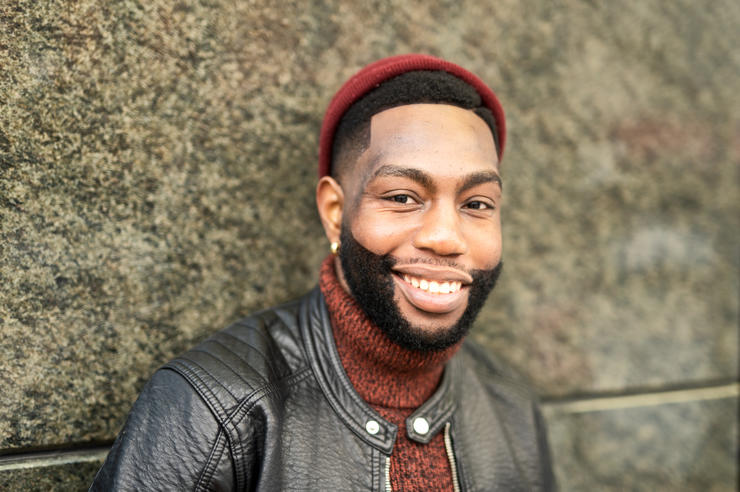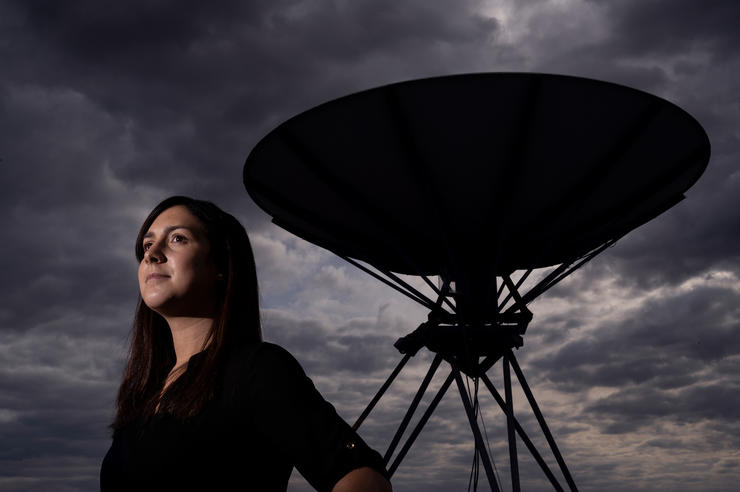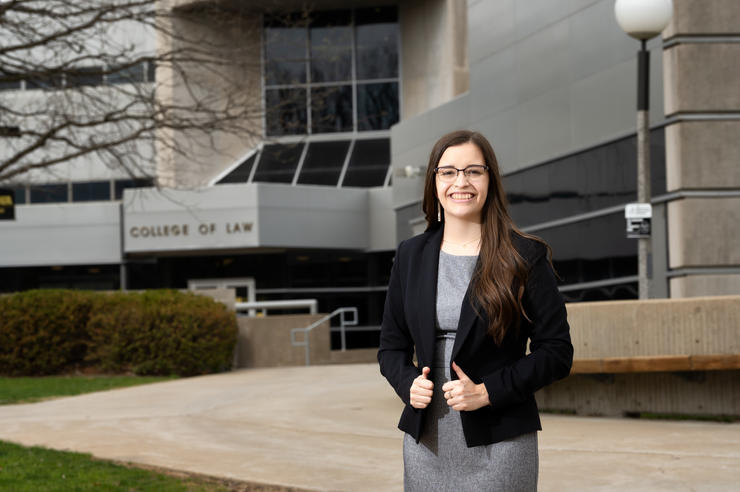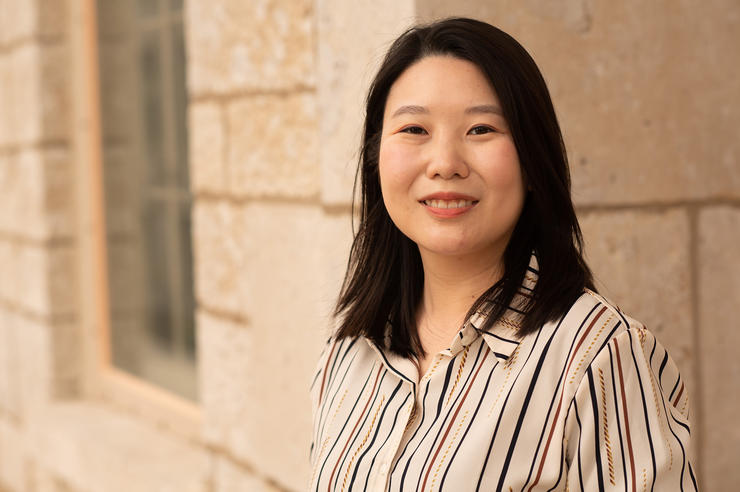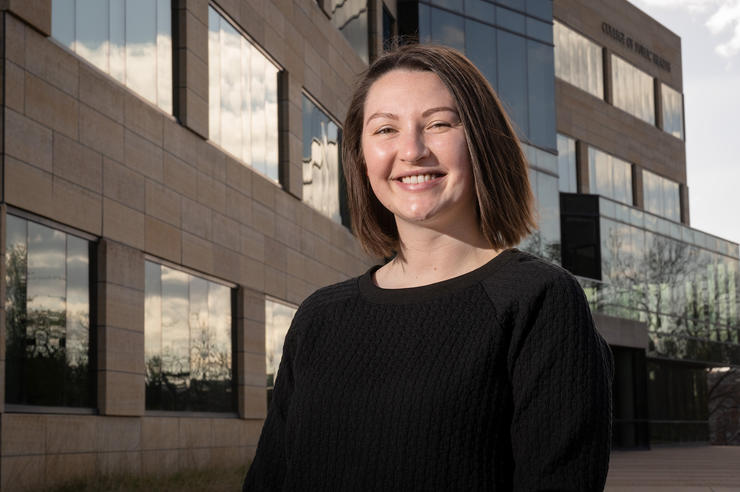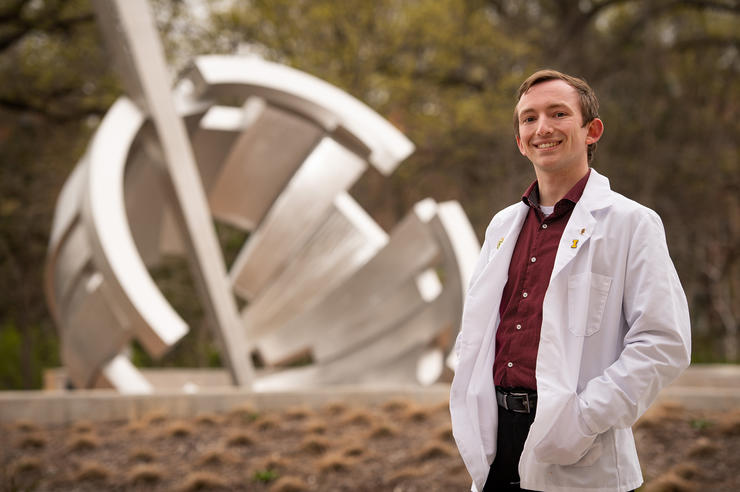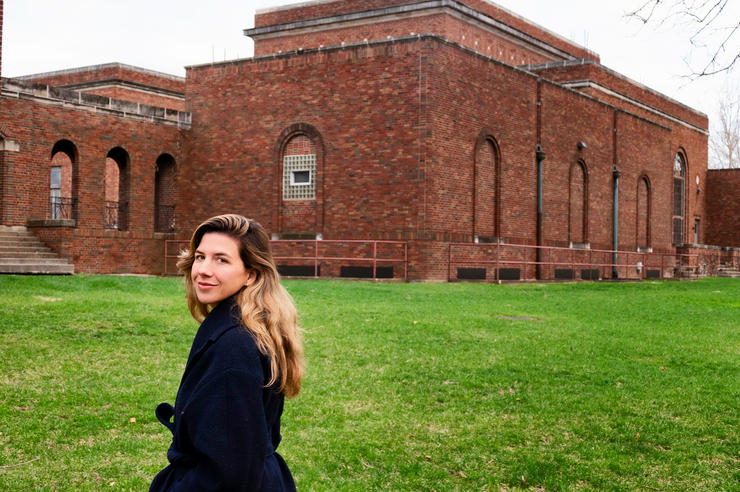Giving voice to the voiceless
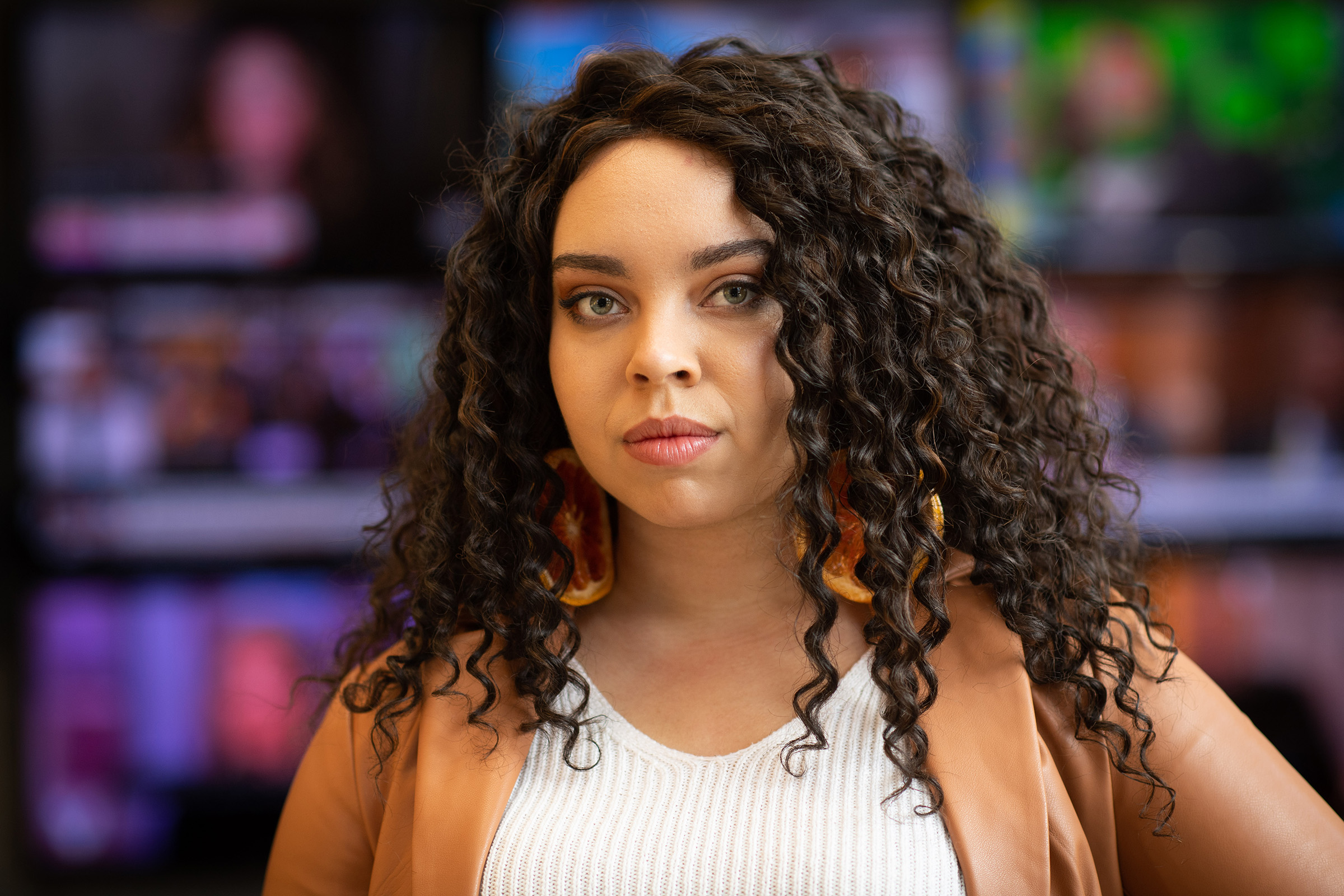
Hometown: Naperville, Illinois
Degree: Double major in journalism and English on the publishing track
Future plans: Work as a general assignment reporter for the summer at the Chicago Sun-Times
Nichole Shaw says she feels her purpose in life is to give a voice to the voiceless.
The journalism and English double major not only found her own voice at the University of Iowa, but she also contributed to her purpose at a campus and national level by writing and editing for publications including The Daily Iowan, Off-Kilter Magazine, and The New York Times.
A bookworm who grew up in Naperville, Illinois, Shaw says she knew she wanted to be a writer in elementary school.
“I was a very curious person, and I always loved talking to people and learning about them,” Shaw says. “I was always thinking about how I could craft beautiful stories like the ones I was reading.”
While she largely chose Iowa because of the financial support it offered—she is now on a full-ride scholarship—she quickly discovered its rich literary history and strong writing community.
“I took a City of Literature class with Loren Glass my first semester and learned about the deep literary roots here,” Shaw says. “I knew I was going to learn from some of the best.”
Shaw says the first time she discovered what writing could really do for her, as well as the effect it could have on others, occurred during a creative nonfiction writing course her second semester at Iowa called The Art and Craft of the Literary Essay, with instructor Lucy Schiller. The final assignment was to write an essay of the writer’s choosing.
“I decided to write about my experience with my roommate my first semester who was micro-aggressive and sometimes just blatantly aggressive and not respectful of my race and culture,” Shaw says. “I wanted to apply my personal experience to a more macro level and see how it reflected larger societal issues that were happening with race and racism. And it also contributed to my personal journey with accepting my Blackness and no longer hiding it behind Eurocentric white beauty standards.”
The essay, “Ashes to White Blackness,” was later published in Fools Magazine.
“I did a reading, and that was such a powerful thing because not only had I written it, but now I was actually speaking it into existence and people were actually listening to me,” Shaw says. “The reactions I got from other people of color who said this story really visualized and embodied some of the struggles that they were going through helped me become so much more secure in knowing what my career could look like. Sharing stories could potentially effect change and bring people a little bit closer to each other by understanding one another.”
Shaw is currently reporting remotely for The New York Times as a member of its Student Journalism Institute. Iowa alumna Megan Heckerman Curatolo, human resources partner at the Times, encouraged Shaw to apply for the institute during a speed-networking event at the UI School of Journalism and Mass Communication.
“I really like that interpersonal connection and being able to support my fellow peers. Even aside from the academic work, being there for them and letting them know that I’m a person who they can come to if they’re having problems, whether it be in a class or outside of class, is so rewarding.”
Application advice from Curatolo and Iowa faculty were instrumental in helping land Shaw a spot in the 2020 institute, she says.
“I was just so excited,” Shaw says. “The person who offered me the position told me he wanted to get more Midwestern representation at the Times and he was glad someone from Iowa applied because we’re a strong writing university.”
As with so many things, COVID-19 threw a wrench in the works, and Shaw ended up joining the 2021 group of institute students, who are collaborating on a project profiling victims of police killings across the country, which is expected to publish in late May. Shaw says her profile has turned into more of an investigative piece that she plans to later pitch as a longer feature story to other publications.
Her second year at Iowa, Shaw was looking for summer jobs and discovered a fellowship with Off-Kilter Media in Chicago, which creates content rooted in inclusive, visual storytelling. She says she liked that Off-Kilter’s content was a bit different from the newspaper work she had been doing as a columnist with The Daily Iowan.
She got the 2019 summer fellowship and was promoted to junior creative lead in the fall and later to her current role as print editorial lead and company editor, in which she assigns, edits, and writes content across all publications.
Shaw says of everything she has gotten to work on for Off-Kilter, her favorite project was an interview with Marci Rodgers, a costume designer who has been director Spike Lee’s recent go-to.
“Here was this Black creative woman who made it, who navigated the industry in a way that didn’t take away from who she was. She stayed very authentic and true to herself,” Shaw says. “That showed me that I don’t have to let this industry take pieces of myself. I can use those pieces of myself instead to inform the public and to build and foster more community engagement and respect for people who might look different.”
After spending a year and a half as a columnist for The Daily Iowan largely covering identity politics and social issues, Shaw was encouraged to join the Student Publications Inc. board of trustees, where she served as vice chair in 2019. In 2020, she became executive chairperson of the board.
Shaw says while she at first felt a bit of impostor syndrome being the only undergraduate student on a board of otherwise working media professionals, she feels she was able to effect change at her former workplace, particularly after the events of summer 2020.
“A lot of the country was realizing that America is still racist and that there are issues that need to be addressed,” Shaw says. “While all these talks were happening around diversity, equity, and inclusion, I spoke with the editor and publisher at The Daily Iowan about how we could actually create sustainable change within the newsroom and not just pay lip service with a statement.”
The talks led to the implementation of The Daily Iowan’s Amplify section, which is focused on uplifting and giving space to marginalized groups of people to share their stories.
Shaw says along with also not limiting those stories only to the Amplify section, but also giving them space within the daily stories throughout the newspaper, they hope the effort also creates a pipeline for more diverse voices in the newsroom.
“We really want to ensure that the people who are telling stories are reflective of the people they are covering and showcase a wide range of perspectives,” Shaw says. “That way when stories are being told, they’re not only fair and accurate, but they’re actually truthful. Because something can be accurate, but it’s very rare that someone can encompass the full truth of the situation.”
Shaw says she’s proud of the work being done, including monthly community chats and the addition of a director of diversity, equity, and inclusion at The Daily Iowan, Cesar Perez, who spearheads initiatives and works with the staff on DEI issues.
In addition to her work with The New York Times, Off-Kilter Media, and The Daily Iowan executive board, Shaw is the editor of two other Iowa student-produced publications, Verve Magazine and NURU, a publication supported by the National Association of Black Journalists. She also has an Iowa Center for Research by Undergraduates fellowship to work on the Center for Afrofuturist Studies’ Oracles of Iowa City mural project.
When she’s not writing or editing for the publications she works for, Shaw enjoys mentoring other students, both as a peer mentor in the School of Journalism and Mass Communication and as an Honors Writing Fellow.

More than 40 Pulitzer Prize winners. Seven U.S. poets laureate. Countless award-winning playwrights, screenwriters, journalists, translators, novelists, and poets. The University of Iowa’s writing programs shape the landscape of American literature. This passion and strength in writing will influence everything you do at Iowa, whether it is writing a screenplay, forming a press release, or distinguishing yourself from other job candidates with an amazing cover letter.
“I really like that interpersonal connection and being able to support my fellow peers,” Shaw says. “Even aside from the academic work, being there for them and letting them know that I’m a person who they can come to if they’re having problems, whether it be in a class or outside of class, is so rewarding. It may sound idealistic, but I truly enjoy meeting with other students because I think it’s important that they have someone who understands their struggle and is in a position to help them in a way that maybe doesn’t feel as intimidating.”
Shaw knows firsthand how important mentors can be, finding many at Iowa. She says her first ardent supporter was Jeffrey Browne, her former boss at Quill and Scroll. Shaw served for nearly two years as the communications director for the organization, an international honor society for high school journalists that began and is based at Iowa.
“Whenever I had an idea about something, he just let me run with it,” Shaw says. “He gave guidance and insight into how to do things effectively and in an ethical way, but he also gave me a lot of agency to explore what journalism could offer and how I could also use my journey of discovery to help high school students who wanted to learn the same things.”
Shaw suggested the organization start a podcast, which she did and served as host, interviewing people such as Ron Stallworth, whose story was made famous by the film BlacKkKlansman; Kai Wright, host and managing editor of The United States of Anxiety podcast; and Mary Beth and John Tinker, free speech activists known for their role in the 1969 Tinker v. Des Moines Independent School District Supreme Court case.
Browne says that Shaw served her professional-level position in the international nonprofit organization with skill, grace, intelligence, and commitment.
“Nichole took over the role and completed almost every communications initiative I dreamed of,” Browne says. “She recorded and hosted our podcast series, took ownership of our weekly news roundup, promoted our programs through social media, reimagined our former print magazine as a digital publication, communicated with our contest judges, prepared presentations and interviewed celebrities, mentored other student assistants—I could go on and on about what Nichole contributed to Quill and Scroll in two years with us. Without a scintilla of doubt, Nichole made Quill and Scroll a better organization than it was before her arrival.”
Shaw says she has appreciated professors’ feedback and help in moving stories forward and getting them published in local, state, and regional publications. She also has a new mentor thanks to a recent Daily Iowan Community Chat that she participated in honoring Black journalists and the School of Journalism and Mass Communication’s new mentorship program: Maudlyne Ihejirika, Iowa alumna and columnist at the Chicago Sun-Times.
“We share a vision for what journalism can do in spotlighting issues that disproportionately affect people who look like us and provide true accounts and nuance to the reality of what’s happening,” Shaw says. “Her mentorship and guidance, even in just the past month, have been so wonderful.”
As she prepares to graduate, Shaw urges current and future students to try new things while in college.
“Go for it because it could be something that you end up falling in love with and it could shift your entire perspective on how you want to navigate and live your life,” Shaw says. “And even if you don’t like it, you learn that you don’t like it, and you also learn a little bit more respect for people that might do it. And I think that’s important as well.”
After graduation, Shaw will move to Chicago, where she will work as a general assignment reporter for the summer at the Chicago Sun-Times. Her dream is to eventually move to New York and write there.
But no matter where she ends up, she knows one thing:
“I’ll essentially still be that person who is telling stories and giving voice to the voiceless.”

